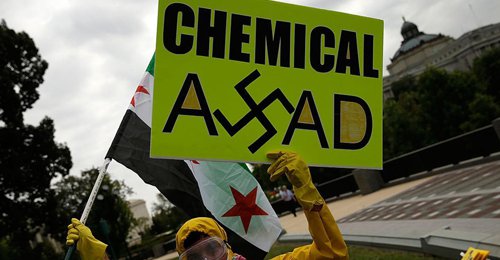 The U.N. Security Council is set to vote on Tuesday on a bid by Western powers to ban the supply of helicopters to the Syrian government and to blacklist Syrian military commanders over accusations of toxic gas attacks, despite a pledge by Russia to veto the move.
The U.N. Security Council is set to vote on Tuesday on a bid by Western powers to ban the supply of helicopters to the Syrian government and to blacklist Syrian military commanders over accusations of toxic gas attacks, despite a pledge by Russia to veto the move.
The Security Council showdown – pitting Syrian ally Russia against the United States, France, Britain and others – comes amid U.N.-led peace talks between the warring Syrian parties in Geneva, which began last week.
A resolution needs nine votes in favor and no vetoes by the United States, France, Russia, Britain or China to be adopted.
Russia has vetoed six Security Council resolutions on Syria since the conflict started in 2011. China joined Moscow in vetoing five resolutions. It was unclear how Beijing planned to vote on Tuesday.
Britain and France first circulated the draft resolution to the 15-member council in late December in response to the results of an investigation by the U.N. and the Organization for the Prohibition of Chemical Weapons (OPCW).
The international inquiry found Syrian government forces were responsible for three chlorine gas attacks and that Islamic State militants had used mustard gas.
British U.N. Ambassador Matthew Rycroft said on Monday that the Security Council needed to send a “strong, clear message that the international community means business on preventing the use of these abhorrent weapons.”
Chlorine’s use as a weapon is banned under the Chemical Weapons Convention, which Syria joined in 2013. If inhaled, chlorine gas turns to hydrochloric acid in the lungs and can kill by burning lungs and drowning victims in body fluids.
Syrian President Bashar al-Assad’s government has denied its forces have used chemical weapons. Russia has questioned the results of the U.N./OPCW inquiry and long said there was not enough proof for the Security Council to take any action.
Russia’s Deputy U.N. Ambassador, Vladimir Safronkov, told reporters on Friday that Moscow would veto the draft resolution.
The draft text seeks to ban the sale or supply of helicopters to the Syrian government because the U.N./OPCW inquiry found Syrian government forces had used helicopters to drop barrel bombs containing chlorine gas.
The draft resolution also proposes targeted sanctions – a travel ban and asset freeze – on 11 Syrian military commanders and officials, as well as on 10 government and related entities accused of developing and producing chemical weapons and the missiles to deliver them.
HRW tells Russia : Don’t Veto Sanctions for Syria Chemical Attacks
Russia and other United Nations Security Council members should support a proposed resolution that would impose sanctions on Syrian government officials responsible for chemical attacks, Human Rights Watch said today.
“The investigation’s clear findings that Syrian government forces used chemical weapons demand a response from the Security Council,” said Ole Solvang, deputy emergencies director at Human Rights Watch. “Vetoing the proposed resolution would undermine the most widely accepted weapons ban in all of international law.”
Syria joined the Chemical Weapons Convention on October 14, 2013, after chemical attacks near Damascus, most likely carried out by government forces, killed hundreds of civilians on August 21, 2013. The Chemical Weapons Convention prohibits the use of chemical weapons as well as the use of the toxic properties of common chemicals such as chlorine to kill or injure.
In April 2014, OPCW established a fact-finding mission to investigate reports that Syrian government helicopters had dropped improvised munitions containing chlorine on opposition-controlled territory. The fact-finding mission, which did not have a mandate to identify those responsible, concluded that chlorine had most likely been used as a weapon in Syria.
Human Rights Watch published reports on the Syrian government’s use of chlorine in May 2014, April 2015, June 2015, September 2016, and February 2017. In the most recent report, Human Rights Watch found that the Syrian government forces’ use of chlorine in late 2016 appeared to be coordinated with the overall military strategy to retake Aleppo.
REUTERS

Leave a Reply
You must be logged in to post a comment.